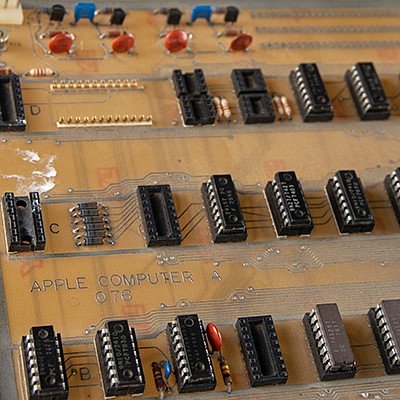Apple: 1983 Macintosh Introduction Plan and Logo Leaflet
Two ways to bid:
- Leave a max absentee bid and the platform will bid on your behalf up to your maximum bid during the live auction.
- Bid live during the auction and your bids will be submitted real-time to the auctioneer.
Bid Increments
| Price | Bid Increment |
|---|---|
| $0 | $5 |
| $50 | $10 |
| $200 | $25 |
| $500 | $50 |
About Auction
Aug 18, 2022
RR Auction support@rrauction.com
- Lot Description
Original spiral-bound "Macintosh Product Introduction Plan," 9 x 11, 106 pages, with the title page reading: "7 October 1983, Company Confidential, Reproduction Prohibited, Document Number: 62, Issued to: John Scull." The fascinating document offers a summary of the Macintosh product and outlines a detailed marketing plan to include national advertisements, promo materials, educational resources, and support for software developers. In particular, the plan offers insight into Apple's business strategy during the era, with commentary on target demographics: "Macintosh is an advanced personal productivity tool for knowledge workers." The plan sees medium businesses as the main target market, followed by home/home businesses, small businesses, large businesses, universities, and scientific/industrial firms.
A significant "Competitive Analysis" section foresees potential attacks by IBM and offers Apple's responses to criticisms involving lack of expandability, limited hardware, lack of software, and incompatibility with other Apple products (the Macintosh is "so revolutionary that it immediately obsoletes everything before it"), among others.
The plan also offers messaging guidelines for Apple's marketers, PR people, and retailers. Although the advertising plan does include "Announce Mac on network TV," there is no reference to the famous '1984' ad, which aired on CBS during the broadcast of Super Bowl XVIII on January 22, 1984. According to this timeline, the original plan was to 'tease' the Mac throughout the month of January before announcing it on January 29th, followed by advertisements during the Winter Olympics (February 7-19). As it happens, the Macintosh got its blockbuster tease during the Super Bowl and was formally introduced two days later on January 24th.
Other intriguing facets of the plan include Apple's international strategy, distribution channels, sales forecasts, introduction events, and more. Moreover, the final page highlights a key business use of the Macintosh: "This is a sample of high resolution printing using Macintosh and an Apple Imagewriter Printer. As you can see, the quality is excellent. We expect this level of print quality to be acceptable to processionals for all office communications." In fine condition, with a few pencil notations throughout and some soiling to the covers. Accompanied by an interesting original "Apple Logo Use Guidelines" leaflet from March 1983, demonstrating correct and incorrect usage of Apple's logo. - Shipping Info
-
Bidder is liable for shipping and handling and providing accurate information as to shipping or delivery locations and arranging for such. RR Auction is unable to combine purchases from other auctions or affiliates into one package for shipping purposes. Lots won will be shipped in a commercially reasonable time after payment in good funds for the merchandise and the shipping fees are received or credit extended, except when third-party shipment occurs. Bidder agrees that service and handling charges related to shipping items which are not pre-paid may be charged to a credit card on file with RR Auction. Successful international Bidders shall provide written shipping instructions, including specified Customs declarations, to RR Auction for any lots to be delivered outside of the United States. NOTE: Declaration value shall be the item’(s) hammer price and RR Auction shall use the correct harmonized code for the lot. Domestic Bidders on lots designated for third-party shipment must designate the common carrier, accept risk of loss, and prepay shipping costs.
-
- Buyer's Premium



 EUR
EUR CAD
CAD AUD
AUD GBP
GBP MXN
MXN HKD
HKD CNY
CNY MYR
MYR SEK
SEK SGD
SGD CHF
CHF THB
THB















